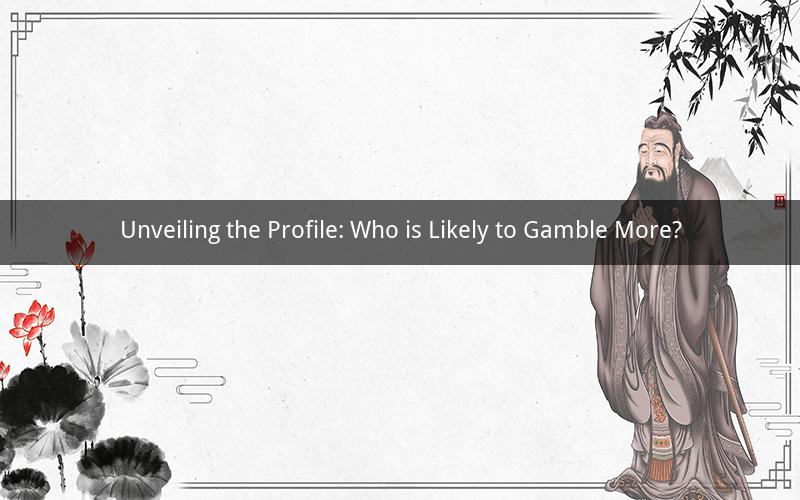
Introduction:
Gambling, an activity that has been present in human society for centuries, continues to be a topic of great interest and concern. With the advent of online gambling platforms, the industry has seen a significant surge in participation. However, not everyone is equally prone to gambling. In this article, we delve into the factors that contribute to an individual's likelihood of engaging in gambling activities, providing insights into who is more susceptible to the allure of gambling.
1. Psychological Factors:
Psychological factors play a crucial role in determining an individual's likelihood of gambling. People who have certain personality traits or mental health conditions may be more prone to gambling. Here are a few psychological factors that can influence one's gambling behavior:
a. Impulsivity: Individuals who are impulsive tend to act on their desires without thinking about the consequences. This impulsivity can lead them to engage in risky activities, including gambling.
b. Risk-taking: Those who have a higher risk-taking propensity are more likely to engage in gambling. This can be due to a desire for excitement or the thrill of winning big.
c. Depression and Anxiety: People who suffer from depression or anxiety may turn to gambling as a form of escapism or as a means to cope with their emotions. However, this can lead to further complications and exacerbate their mental health issues.
2. Social Factors:
Social factors also play a significant role in determining an individual's likelihood of gambling. Here are a few social factors that can influence gambling behavior:
a. Peer Influence: Individuals who have friends or family members who gamble are more likely to engage in gambling themselves. Peer pressure and social norms can greatly impact one's gambling behavior.
b. Cultural Background: Some cultures may promote gambling as a form of entertainment or as a way to bring people together. In such cultures, individuals may be more likely to engage in gambling activities.
c. Accessibility: The ease of access to gambling facilities or online platforms can increase the likelihood of individuals engaging in gambling. If gambling is readily available, people may be more inclined to try their luck.
3. Economic Factors:
Economic factors can also contribute to an individual's likelihood of gambling. Here are a few economic factors that can influence gambling behavior:
a. Financial Stress: Individuals who are facing financial difficulties may be more inclined to gamble as a means to alleviate their stress or as a way to make quick money.
b. Income Level: Research has shown that individuals with lower income levels may be more likely to engage in gambling compared to those with higher income levels. This could be due to the desire to improve their financial situation or the belief that gambling can provide a substantial income.
c. Debt: Individuals who are in debt may turn to gambling as a way to escape their financial obligations or as a means to repay their debts. However, this can lead to a dangerous cycle of debt and gambling.
4. Age and Gender:
Age and gender also play a role in determining an individual's likelihood of gambling. Here are a few factors related to age and gender:
a. Age: Younger individuals may be more prone to gambling due to their desire for excitement, impulsivity, and exposure to gambling through various media channels.
b. Gender: While both men and women can be prone to gambling, research has shown that men may be more likely to engage in gambling compared to women. This could be due to various factors, including social norms and gender roles.
5. Technological Advancements:
The rise of online gambling platforms has significantly changed the landscape of gambling. Technological advancements have made it easier for individuals to access gambling activities from the comfort of their own homes. This has led to an increase in the likelihood of individuals engaging in gambling. Here are a few technological factors that contribute to this trend:
a. Mobile Gaming: The proliferation of smartphones and mobile apps has made gambling more accessible than ever. Individuals can now engage in gambling activities anytime, anywhere.
b. Online Communities: Online gambling communities and forums provide a platform for individuals to share their experiences, seek advice, and even form gambling partnerships. This can further fuel the likelihood of individuals engaging in gambling.
Conclusion:
Understanding who is likely to gamble more requires examining a combination of psychological, social, economic, age, gender, and technological factors. By recognizing these factors, policymakers, researchers, and individuals can work towards implementing measures to mitigate the negative consequences of gambling and promote responsible gambling practices.
Questions and Answers:
1. What psychological factors contribute to an individual's likelihood of gambling?
Answer: Psychological factors such as impulsivity, risk-taking propensity, and mental health conditions like depression and anxiety can contribute to an individual's likelihood of gambling.
2. How do social factors influence gambling behavior?
Answer: Social factors such as peer influence, cultural background, and accessibility to gambling facilities can influence an individual's likelihood of engaging in gambling activities.
3. What economic factors can contribute to an individual's likelihood of gambling?
Answer: Economic factors such as financial stress, income level, and debt can contribute to an individual's likelihood of gambling.
4. How do age and gender play a role in determining an individual's likelihood of gambling?
Answer: Younger individuals may be more prone to gambling due to their desire for excitement and impulsivity, while research has shown that men may be more likely to engage in gambling compared to women.
5. How have technological advancements influenced the likelihood of individuals engaging in gambling?
Answer: Technological advancements such as mobile gaming and online communities have made gambling more accessible, contributing to the likelihood of individuals engaging in gambling activities.